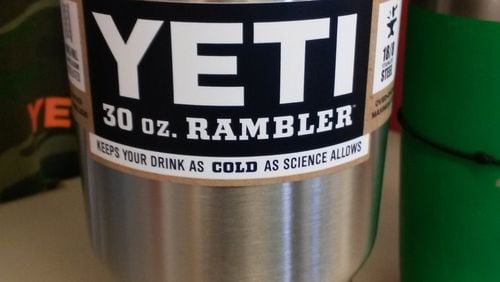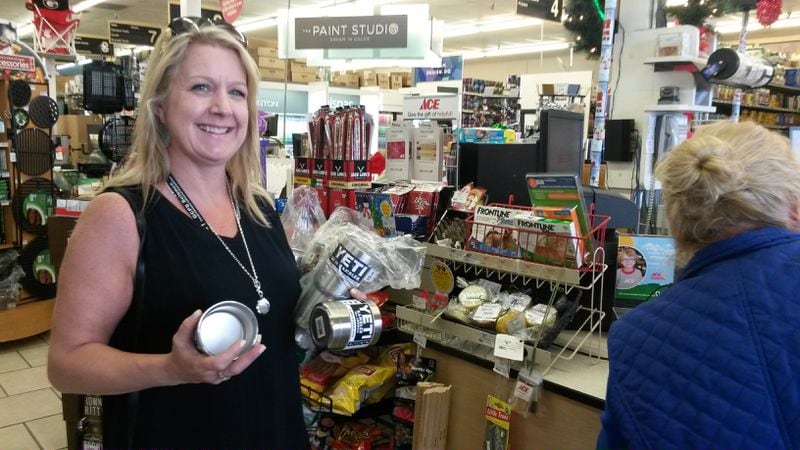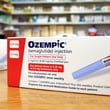Some top U.S. toy crazes of the past 40 years:
2006 — Nintendo Wii
1998 — Furby
1996 — Beanie Babies
1996 — Tickle Me Elmo
1985 — Teddy Ruxpin
1984 — Transformers
1983 — Cabbage Patch Kids
1977 — “Star Wars” action figures
Sources: MSNBC (http://www.nbcnews.com/id/40059786/ns/business-retail/t/must-have-toy-hits-christmases-past/#.Vm-A2F4eq9Y)
“I got sucked into it,” the woman holding an armful of high-priced cups told me.
She had just dished out $40 apiece for Yeti Rambler Tumblers that she told me she would never have even thought of buying two days earlier. But then a co-worker raved about the 30-ounce thermal cups and described the scramble to find them and the limited supply and, well, Patty Baxter of Buford, Ga., got caught up in the excitement.
Baxter called a local Ace Hardware – word was out that it had a few left – and begged the floor manager to give her 15 minutes to get there. They might last that long, he told her.
Is that a faint reminder of the gift crazes of Christmases past? Why, yes, I do hear the taunting giggle of Tickle Me Elmo and the Cabbage Patch Kids.
A clerk at a Dick's Sporting Goods in metro Atlanta told me a load of 300 Yeti Rambler Tumblers lasted only two hours on the shelves. Someone at Academy Sports + Outdoors described how her location had been out of the largest Yeti cups for weeks. And a worker at a local Bass Pro Shops told me a single cup had been returned by a customer, but it hadn't even made it off the return desk before another shopper snagged it.
Scott Snedecor, the store manager and part owner of the S&S Ace Hardware & Mower in Buford, said the last time his store faced such a stark imbalance of supply and demand was in the late 1980s when Black & Decker came out with a cordless screwdriver.
The cup craze isn’t just an issue in the South.
“It explodes off the shelf,” said Lee Beasley, the general manager of Bass Pro Shop’s mammoth flagship store in Springfield, Mo.
All the chain’s 78 outdoor stores in North America were struggling to keep the cups stocked, he said. Ninety percent of the calls to his store are from shoppers scrambling to find the product. Order one now from Bass Pro Shops and you’ll wait at least a month to get it. It’s the “it” product of the season for some retailers.
“Every year there are items that tend to pop up like that, and we have no idea what it’s going to be,” Beasley said.
In 2014, it was anything that carried the “Duck Dynasty” brand, which was a whole lot of stuff. This time around, it’s just the Yeti 30- and 20-ounce cups.
“I don’t get it,” was Beasley’s initial reaction when he first heard the buzz and saw the product.
Now, he’s got two.
Fans tell me the cup with double stainless steel “vacuum-insulated” walls somehow keeps a drink so cold that ice in it lasts for eight hours. They say it will retain the heat of coffee for nearly as long.
Me? I actually drink my drinks or get new ones, rather than letting old ones sit for half the day.
So why is this product The One to take off this season? Here’s some thoughts I pulled from customers and people in retail:
Though it’s pricey for a cup, a $40 extravagance is still manageable for many shoppers.
It has lots of potential customers: Anyone who sips.
It’s got aspirational label appeal. Yeti, the cup’s maker, is mostly known for super high-end coolers ($250-$1,400, gulp) designed to withstand a Grizzly attack, in case that happens to be a worry. The cup is a less expensive way to share the name tag.
The cup apparently performs exceptionally for what it sets out to do and has great word-of-mouth referrals.
Scarcity feeds the hunger.
A manager at one small retailer even wondered whether the folks at Austin, Texas-based Yeti might be purposely constraining cup supplies to boost their appeal.
I tried to get a Yeti executive on the phone. A PR person told me the company isn’t commenting about its tumbler business. He thanked me for my understanding, though I don’t actually understand.
Shortages can help build brand buzz for consumer products companies, but most probably would prefer having the sales instead, said Steve Osburn, a strategist for management consulting firm Kurt Salmon.
The broader issue is that its hard for retailers to guess what will be hot, he said. By the time they realize what consumers want during the Christmas rush, it’s often too late for manufacturers to massively ramp up supplies.
Osburn told me his wife gave him a Yeti cup several months ago. Now, instead of getting two or three successive cups of coffee each morning, he fills up the Yeti with one giant helping, he said. “Before I was given the cup, it never dawned on me that that was a need.”
Of course, we don’t really have an immediate need for this stuff. Christmas gift crazes mess with our financial equilibrium. (Yeti cups were recently being advertised by online re-sellers for $100 each, two and a half times the regular price.)
But for Patty Baxter, who I spotted buying that armful of Yeti cups, it solved a problem many of us face.
“I don’t have an abundance of ideas for Christmas” gifts, she told me. The cups would cover people on her list.
Plus, she got one for herself. And two little ones for her boss, who called when she heard Baxter had a bead on a supply.
About the Author








